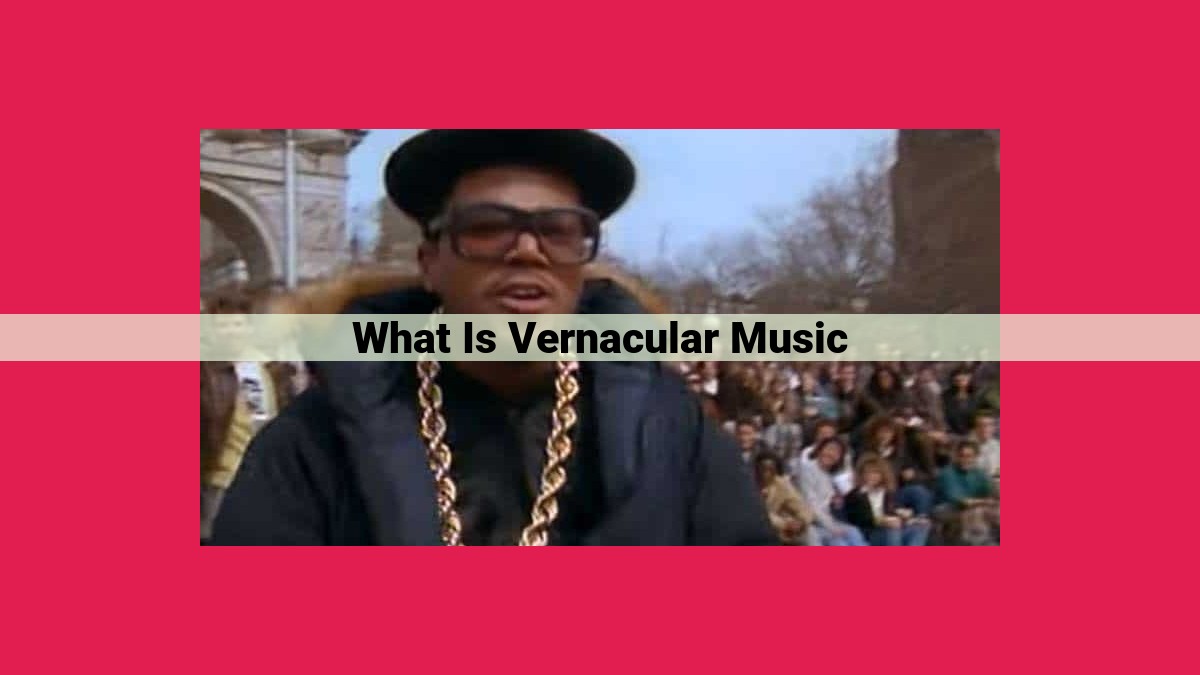Vernacular Music: Bridging The Gap Between Tradition And Modernity

Vernacular music, rooted in local traditions, expresses the unique cultural identity of a community. Unlike folk music’s focus on rural traditions, vernacular music encompasses diverse urban and rural forms, blurring the lines between traditional, world, ethnic, and even popular music. It reflects the vibrant cultural exchange and adaptations that shape our musical landscapes, preserving heritage while embracing modernity.
Vernacular Music: Definition and Distinctive Characteristics
Vernacular music, also known as folkloric music, encompasses a vast array of musical expressions that are deeply rooted in local cultures and traditions. It’s a spontaneous form of musical creation that often resonates with the everyday lives and experiences of a particular community.
Unlike commercial music, which is often produced for mass consumption, vernacular music is typically created and passed down within a specific group of people. This close connection to the community gives vernacular music a unique authenticity and authenticity.
Vernacular music often exhibits several distinctive features that set it apart from other genres. These include:
Simplicity and Spontaneity: Vernacular music is often characterized by its simplicity and unpolished nature. It is frequently performed without any formal training or musical notation, relying instead on improvisation and collective participation.
Use of Traditional Instruments: Vernacular music often employs unique and region-specific instruments. These instruments may be handmade or crafted from everyday objects, reflecting the cultural heritage and ingenuity of the community.
Focus on Storytelling: Vernacular music frequently serves as a means of storytelling and cultural preservation. Its lyrics often depict folk tales, legends, and personal experiences, providing a glimpse into the collective memory and values of the community.
Community-based Performance: Vernacular music is typically performed in community settings, such as gatherings, festivals, and rituals. These performances foster a sense of belonging and connection among community members, strengthening social bonds and cultural identity.
Vernacular Music and Its Related Concepts
Vernacular vs. Folk Music
Vernacular music and folk music share a close connection, rooted in the cultural life and traditions of communities. Both genres reflect the experiences, values, and storytelling of everyday people. However, vernacular music often lacks the formal structure and widespread recognition associated with folk music.
Vernacular vs. Traditional Music
Vernacular music often overlaps with traditional music. Both forms preserve and transmit cultural heritage. Vernacular music, however, is typically more fluid and subject to change, while traditional music strives to maintain established forms and practices.
Vernacular vs. World Music
Vernacular music transcends geographical boundaries, embracing the global diversity of musical expression. Influences and adaptations flow across borders, creating a rich tapestry of sounds and styles. Vernacular music showcases the cultural exchange and interconnectedness of human communities.
Vernacular vs. Ethnic Music
Vernacular music has strong ties to ethnic groups and their cultural identities. It provides a powerful voice for expressing cultural heritage, preserving languages, and connecting people across generations and communities. Vernacular music celebrates the uniqueness and vitality of diverse ethnic traditions.
Popular Music vs. Vernacular Music: A Tale of Two Worlds
In the realm of music, where melodies dance and rhythms sway, a fascinating distinction emerges between vernacular music and its commercial counterpart, popular music. While both captivate our hearts and souls, their origins, nature, and impact on society stand worlds apart.
Vernacular Music: Rooted in Community
Vernacular music is the heartfelt expression of a community, born from the tapestry of its traditions, customs, and shared experiences. It’s not a commercial product but a living, breathing tradition that weaves together the fabric of a culture. It’s sung in local dialects, played with indigenous instruments, and passed down through generations, carrying the stories and spirit of a people.
Commercial Music: Market-Driven and Mass-Appealing
In contrast, popular music is a product of the entertainment industry, crafted for widespread consumption and financial gain. It’s heavily influenced by market trends and mass appeal, often sacrificing authenticity and community connection for commercial success. Pop songs are typically written and produced by professional musicians and marketed through extensive advertising campaigns.
Independent Music: A Bridge Between Worlds
While the divide between vernacular and commercial music can be vast, a vibrant bridge emerges in the form of independent music. Indie artists often blend vernacular styles with contemporary sounds, creating music that defies traditional categorization. They prioritize artistic freedom and authenticity over commercial success, forging a connection with audiences who seek music that speaks to their hearts.
Despite the dominance of popular music in the global marketplace, vernacular music remains an enduring force, a testament to the resilience of culture and the power of community. It shapes cultural identity, preserves traditions, and offers a unique window into the lived experiences of people around the world. Whether it’s the soulful melodies of Irish folk songs or the rhythmic pulse of African drumming, vernacular music continues to inspire, connect, and enrich our lives.